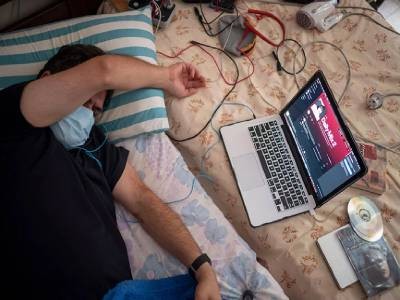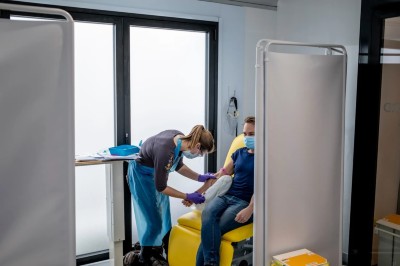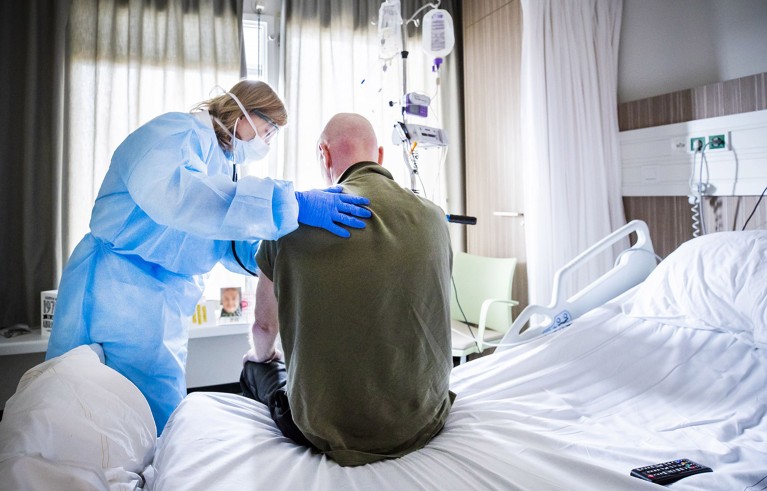When Paul Zimmer-Harwood volunteered to be intentionally infected with SARS-CoV-2, he wasn’t sure what to expect. He was ready for a repeat of his first brush with COVID-19, through a naturally acquired infection that gave him influenza-like symptoms. But he hoped his immunity would help him feel well enough to use the indoor bicycle trainer that he had brought into quarantine.
It turned out that Zimmer-Harwood, a PhD student at University of Oxford, UK, had nothing to worry about. Neither he nor any of the 35 other people who participated in the ‘challenge’ trial actually got COVID-19.
Scientists deliberately gave people COVID — here’s what they learnt
The study’s results, published on 1 May in Lancet Microbe1, raise questions about the usefulness of COVID-19 challenge trials for testing vaccines, drugs and other therapeutics. “If you can’t get people infected, then you can’t test those things,” says Tom Peacock, a virologist at Imperial College London. Viral strains used in challenge trials take many months to produce, making it impossible to match emerging circulating variants that can overcome high levels of existing immunity in populations.
Researchers use challenge trials to understand infections and quickly test vaccines and therapies. In March 2021, after months of ethical debate, UK researchers launched the world’s first COVID-19 challenge trial. The study2 identified a minuscule dose of the SARS-CoV-2 strain that circulated in the early days of the pandemic that could infect about half of the participants, who had not previously been infected with the virus (at that time, vaccines weren’t yet widely available).
In parallel, a team led by Helen McShane, an infectious-disease researcher at Oxford, launched a second SARS-CoV-2 challenge study in people — including Zimmer-Harwood — who had recovered from naturally caught SARS-CoV-2 infections, caused by a range of variants. The trial later enrolled participants who had also been vaccinated.
Evolving strains
The first participants got the same tiny dose of the ‘ancestral’ SARS-CoV-2 strain as did those in the first trial. When nobody developed a sustained infection, the researchers increased the dose by more and more in subsequent groups of participants, until they reached a level 10,000 times the initial dose. A few volunteers developed short-lived infections, but these quickly vanished.
These volunteers want to be infected with disease to aid research — will their altruism help?
“We were quite surprised,” says Susan Jackson, a study clinician at Oxford and co-author of the latest study. “Moving forward, if you want a COVID challenge study, you’re going to have to find a dose that infects people.”
Despite their immunity to the ancestral strains, nearly 40% of the participants experienced an Omicron infection after being released from quarantine by December 2022, and one even got it twice.
An ongoing COVID-19 challenge trial at Imperial College London, in which participants have been exposed to the Delta SARS-CoV-2 variant, has also encountered problems with infecting participants reliably, says Christopher Chiu, an immunologist and infectious-disease physician at Imperial who is leading that trial and was involved in the other challenge trials. Some participants have experienced infections, but probably not enough for a study testing whether a vaccine works, adds Chiu.
“We need a challenge strain that’s more representative of what’s circulating in the community,” says Anna Durbin, a vaccine scientist at Johns Hopkins University School of Medicine in Baltimore, Maryland, who was a member of the board that oversaw the safety of the latest ‘reinfection’ trial.
Viral strains used in challenge trials are produced under stringent conditions, a process that can take six months or longer, say scientists, making it impossible to match circulating variants perfectly. McShane and Chiu are readying a challenge trial using the BA.5 Omicron subvariant that emerged in 2022.
Raising doses
Researchers are looking at other ways to give people COVID-19. Jackson says that an even higher SARS-CoV-2 dose might be needed — one similar to doses used in influenza challenge trials, in which participants have substantial immunity. Another method could be giving participants multiple doses. Chiu says that his team is exploring the possibility of screening potential participants to identify those with low levels of immune protection against the BA.5 variant and any future challenge strains.
Chiu is leading a consortium that in March was awarded US$57 million by the European Union and CEPI, the Coalition for Epidemic Preparedness Innovations in Oslo, to use challenge trials to test inhaled and intranasal COVID-19 vaccines that might also block transmission. He’s hopeful that such changes to trial protocols will do the trick. “What you really want is a model that replicates a genuine infection and ideally one that cause some symptoms,” he adds.
Zimmer-Harwood, who also works for a non-profit organization that advocates for challenge trials and their participants, says he would welcome changes that make COVID-19 challenge trials more useful to researchers — even if that means a bit less time on the bicycle trainer.


 These volunteers want to be infected with disease to aid research — will their altruism help?
These volunteers want to be infected with disease to aid research — will their altruism help?
 Scientists deliberately gave people COVID — here’s what they learnt
Scientists deliberately gave people COVID — here’s what they learnt
 Should scientists infect healthy people with the coronavirus to test vaccines?
Should scientists infect healthy people with the coronavirus to test vaccines?





